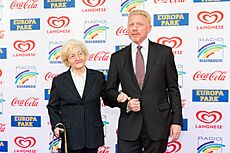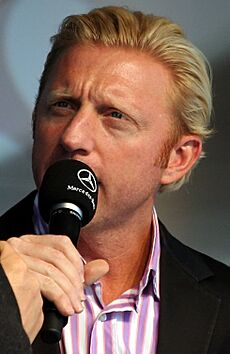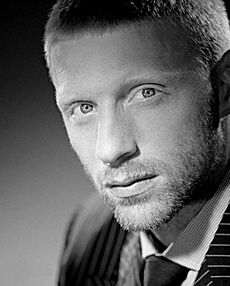Boris Becker facts for kids

Becker in 2019
|
||||||||||||||
| Full name | Boris Franz Becker | |||||||||||||
|---|---|---|---|---|---|---|---|---|---|---|---|---|---|---|
| Country (sports) |
|
|||||||||||||
| Born | 22 November 1967 Leimen, Baden-Württemberg, West Germany |
|||||||||||||
| Height | 1.91 m (6 ft 3 in) | |||||||||||||
| Turned pro | 1984 (amateur 1983) | |||||||||||||
| Retired | 1999 | |||||||||||||
| Plays | Right-handed (one-handed backhand) | |||||||||||||
| Coach |
|
|||||||||||||
| Prize money | US$25,080,956
|
|||||||||||||
| Int. Tennis HoF | 2003 (member page) | |||||||||||||
| Singles | ||||||||||||||
| Career record | 713–214 (76.9%) | |||||||||||||
| Career titles | 49 | |||||||||||||
| Highest ranking | No. 1 (28 January 1991) | |||||||||||||
| Grand Slam singles results | ||||||||||||||
| Australian Open | W (1991, 1996) | |||||||||||||
| French Open | SF (1987, 1989, 1991) | |||||||||||||
| Wimbledon | W (1985, 1986, 1989) | |||||||||||||
| US Open | W (1989) | |||||||||||||
| Other tournaments | ||||||||||||||
| Tour Finals | W (1988, 1992, 1995) | |||||||||||||
| Grand Slam Cup | W (1996) | |||||||||||||
| WCT Finals | W (1988) | |||||||||||||
| Olympic Games | 3R (1992) | |||||||||||||
| Doubles | ||||||||||||||
| Career record | 254–136 (65.1%) | |||||||||||||
| Career titles | 15 | |||||||||||||
| Highest ranking | No. 6 (22 September 1986) | |||||||||||||
| Grand Slam doubles results | ||||||||||||||
| Australian Open | QF (1985) | |||||||||||||
| Other doubles tournaments | ||||||||||||||
| Olympic Games | W (1992) | |||||||||||||
| Team competitions | ||||||||||||||
| Davis Cup | W (1988, 1989) | |||||||||||||
| Hopman Cup | W (1995) | |||||||||||||
| Coaching career (2013–2016, 2023-2024) | ||||||||||||||
|
||||||||||||||
| Coaching achievements | ||||||||||||||
| Coachee singles titles total | 25 | |||||||||||||
| List of notable tournaments (with champion)
|
||||||||||||||
|
Medal record
|
||||||||||||||
Boris Franz Becker (born 22 November 1967) is a famous German former professional tennis player. He also worked as a tennis coach and a commentator. Boris Becker was once ranked as the world No. 1 in men's singles by the Association of Tennis Professionals (ATP).
Becker won 49 singles titles and 15 doubles titles during his career. This includes six major Grand Slam singles titles. He won three Wimbledon Championships, two Australian Opens, and one US Open. He also won 13 Masters titles and three year-end championships. In 1992, he won an Olympic gold medal in men's doubles. He also helped Germany win two Davis Cup titles in 1988 and 1989.
Boris Becker became the youngest-ever winner of the men's singles Wimbledon title. He achieved this amazing feat when he was just 17 years old in 1985. Many people say Becker helped start "power tennis" because of his fast serves and strong all-court game. He is known for having one of the best win percentages in the Open Era of tennis. In 1989, the ATP and ITF named him the Player of the Year.
After his tennis career, Becker became a tennis commentator and a well-known media personality. He coached famous players like Novak Djokovic for three years. He also played poker professionally. In recent years, he faced some legal challenges. He was released from prison in December 2022 and returned to Germany.
Contents
Early Life and Tennis Beginnings
Boris Becker was born in 1967 in Leimen, a town in Germany. His parents were Elvira and Karl-Heinz Becker. His father, Karl-Heinz, was an architect. He started a tennis center in Leimen where Boris learned to play.
In 1974, Boris joined the TC Blau-Weiß Leimen tennis club. He began training with coach Boris Breskvar. By 1977, he was part of the junior team for the Baden Tennis Association. He won the South German championship and the first German Youth Tennis Tournament.
In 1977, Richard Schönborn chose him for the German Tennis Federation's top junior team. The Federation helped pay for Becker's training. In 1981, he joined the Federation's main men's team. He won the doubles title at the Orange Bowl International Tennis Championships in 1982.
Becoming a Tennis Star
Boris Becker became a professional tennis player in 1984. His coach was Günther Bosch and his manager was Ion Ţiriac. He won his first professional doubles title in Munich that same year. As a teenager, Becker won the Tennis World Young Masters in 1985.
Wimbledon Wins and Records
In June 1985, he won his first big singles title at Queen's Club. Just two weeks later, on July 7, he made history at Wimbledon. He became the first unseeded player and the first German to win the Wimbledon singles title. He beat Kevin Curren in four sets.
Becker was ranked 20th in the ATP at the time. He was the youngest male Grand Slam singles champion ever at 17 years old. This record was later broken by Michael Chang in 1989. Two months after Wimbledon, Becker became the youngest winner of the Cincinnati Open.
In 1986, Becker successfully defended his Wimbledon title. He defeated the No. 1 player, Ivan Lendl, in the final. In 1987, he lost early at Wimbledon. That year, he played one of the longest matches in tennis history in the Davis Cup against John McEnroe. Becker won the match, which lasted over six hours.
Grand Slam Successes
Becker reached the Wimbledon final again in 1988. He lost to Stefan Edberg in a match that started a big rivalry. Becker also helped West Germany win its first Davis Cup in 1988. He won the year-end Masters title in New York City.
In 1989, Becker won two Grand Slam singles titles. This was the only year he won more than one. He beat Edberg in the Wimbledon final. Then, he defeated Lendl in the US Open final. He also helped West Germany keep the Davis Cup. He was named Player of The Year by the ATP Tour.
In 1990, Becker met Edberg in the Wimbledon final for the third year in a row. This time, he lost in a long five-set match. In 1991, Becker reached the Australian Open final for the first time. He defeated Lendl to become the No. 1 player in the world. He was ranked No. 1 for 12 weeks in 1991.
He reached his fourth straight Wimbledon final in 1991. However, he lost to fellow German Michael Stich. Becker and Stich had a strong rivalry. But in 1992, they teamed up to win the men's doubles gold medal at the Olympic Games in Barcelona.
In 1992, Becker won seven tour titles. This included his second ATP Tour World Championships.
Later Career and Retirement
In 1995, Becker reached the Wimbledon final for the seventh time. He lost to Pete Sampras. Becker won the year-end ATP Tour World Championships for the third and last time that year.
In 1996, Becker won his sixth and final Grand Slam title. He defeated Michael Chang in the final of the Australian Open. After winning the Queen's Club Championships for the fourth time, he was expected to do well at Wimbledon. However, he had to withdraw due to a wrist injury.
Becker played Wimbledon one more time in 1999. He lost in the fourth round to Patrick Rafter. He received a standing ovation from the crowd. This was his final appearance at the tournament.
Becker played best on fast surfaces like grass courts and indoor carpet. He won 26 titles on carpet. He reached a few singles finals on clay courts but never won a title on that surface. He did win an Olympic Gold Medal in doubles on clay in 1992.
Throughout his career, Becker won 49 singles titles and 15 doubles titles. He was inducted into the International Tennis Hall of Fame in 2003. He sometimes plays on the senior tour. He has also worked as a commentator for the BBC at Wimbledon.
Playing Style and Nicknames
Boris Becker's tennis game was known for his fast and accurate serve. This earned him nicknames like "Boom Boom," "Der Bomber," and "Baron von Slam." He was also excellent at volleying at the net.
He was very athletic at the net. His "diving volley" was a special move that fans loved. The "Becker dive" and "Becker roll" were unique and exciting to watch. His strong forehand and return of serve were also key parts of his game.
Becker sometimes tried to play from the back of the court, even though he was best at serve-and-volley. He was known for showing his emotions on court. He would sometimes get upset if he felt he was playing badly.
His dramatic play led to new tennis terms. These included the Becker Blocker (a quick return shot) and the Becker Hecht (a flying lunge). Other terms were the Becker Faust ("Becker Fist") and the Becker Shuffle (a dance he did after important points).
Becker was one of the best players on grass courts and carpet courts. He had less success on clay. He never won a singles title on clay. However, he won an Olympic gold medal in doubles on clay with Michael Stich in 1992.
Career Statistics
Singles Performance Timeline
| W | F | SF | QF | #R | RR | Q# | A | NH |
| West Germany | Germany | |||||||||||||||||||
| Tournament | 1983 | 1984 | 1985 | 1986 | 1987 | 1988 | 1989 | 1990 | 1991 | 1992 | 1993 | 1994 | 1995 | 1996 | 1997 | 1998 | 1999 | SR | W–L | Win % |
|---|---|---|---|---|---|---|---|---|---|---|---|---|---|---|---|---|---|---|---|---|
| Grand Slam tournaments | ||||||||||||||||||||
| Australian Open | A | QF | 2R | NH | 4R | A | 4R | QF | W | 3R | 1R | A | 1R | W | 1R | A | A | 2 / 11 | 29–9 | 76% |
| French Open | A | A | 2R | QF | SF | 4R | SF | 1R | SF | A | 2R | A | 3R | A | A | A | A | 0 / 9 | 26–9 | 74% |
| Wimbledon | A | 3R | W | W | 2R | F | W | F | F | QF | SF | SF | F | 3R | QF | A | 4R | 3 / 15 | 71–12 | 86% |
| US Open | A | A | 4R | SF | 4R | 2R | W | SF | 3R | 4R | 4R | 1R | SF | A | A | A | A | 1 / 11 | 37–10 | 79% |
| Win–loss | 0–0 | 6–2 | 11–3 | 16–2 | 11–4 | 10–3 | 22–2 | 15–4 | 20–3 | 9–3 | 9–4 | 5–2 | 13–4 | 9–1 | 4–2 | 0–0 | 3–1 | 6 / 46 | 163–40 | 80% |
| Year-end championships | ||||||||||||||||||||
| Tennis Masters Cup | DNQ | F | F | RR | W | F | SF | RR | W | DNQ | F | W | F | did not qualify | 3 / 11 | 36–13 | 73% | |||
| WCT Finals | did not qualify | F | A | W | A | discontinued | 1 / 2 | 5–1 | 83% | |||||||||||
| Win–loss | 0–0 | 0–0 | 3–1 | 6–2 | 1–2 | 7–1 | 4–1 | 3–1 | 2–1 | 4–1 | 0–1 | 5–2 | 6–2 | 7–2 | 0–1 | 0–0 | 0–0 | 5 / 18 | 48–18 | 73% |
| Year-end ranking | 563 | 66 | 6 | 2 | 5 | 4 | 2 | 2 | 3 | 5 | 11 | 3 | 4 | 6 | 62 | 69 | 131 | $25,080,956 | ||
Records Achieved
- These records were set during the Open Era of tennis.
- Records in bold mean they are unique achievements.
- ^ means a continuous streak.
| Championship | Years | Record accomplished | Player tied |
|---|---|---|---|
| Wimbledon | 1985 | Youngest Wimbledon singles champion | Stands alone |
| 1985 | Unseeded winner of singles title | Goran Ivanišević | |
| Grand Prix | 1986 | 3 titles in three weeks across three continents (Sydney, Tokyo, Paris) | Stands alone |
| ATP Championship series | 1990 | 4 titles won in a single season | Juan Martín del Potro Stefan Edberg |
| Stockholm Open | 1988, 1990–1991, 1994 | 4 singles titles | John McEnroe |
Historical Standing in Tennis
Tennis magazine ranked Becker as the 11th best male player from 1965 to 2005.
Professional Awards
- ITF World Champion: 1989.
- ATP Player of the Year: 1989.
- ATP Most Improved Player: 1985.
Life After Playing Tennis
In 2012, Becker talked about his life after tennis. He said, "I had won so much by 22, a number of Wimbledon titles, US Open, Davis Cup, World number one. You look for the next big thing and that isn't in tennis."
Business Ventures
Since 2000, Becker has been a main owner of the tennis part of Völkl Inc.. This company makes tennis rackets and clothing.
In 2003, Becker's autobiography, Augenblick, verweile doch... (meaning The Player), was published. It became a bestseller.
In May 2009, Becker launched an online media platform called Boris Becker TV. This website features videos from his career and daily life.
In June 2015, another book about Becker was published. It was called Boris Becker's Wimbledon: My Life and Career at the All England Club. Novak Djokovic, whom Becker coached, wrote the introduction.
Tennis Commentator and Media Work
Working for BBC
In 2002, Becker started working as a commentator for the BBC at Wimbledon. He continued this job for many years. He moved to the United Kingdom in 2012 and lived in London.
During the 2022 Wimbledon Championships, Becker was not there. His former colleagues on BBC, like Andrew Castle and John McEnroe, sent him messages of support.
Becker also appeared on British TV shows. From 2005 to 2006, he was a team captain on the sports quiz show They Think It's All Over. He also appeared on the car show Top Gear.
Working for Eurosport
From 2017, Becker started working for Eurosport. He appeared regularly on their Grand Slam tennis coverage. He often worked with other former tennis players like Mats Wilander. He also had his own German-language show called Matchball Becker.
In May 2022, Eurosport replaced Becker with Mischa Zverev. They also renamed his show. After Becker was released from prison in December 2022, Eurosport announced he would return for their 2023 Australian Open coverage.
Tennis Administration and Charity
After his playing career, Becker joined the economic advisory board of Bayern Munich for ten years.
On August 23, 2017, Becker was named the head of men's tennis for the German Tennis Federation (DTB).
Becker also supports the Elton John AIDS Foundation.
Playing Poker
Becker is a known poker player. He has played in the European Poker Tour and the World Poker Tour. By 2013, he had won over €90,000 from poker. From 2007 to 2013, Becker was part of the celebrity team for the online poker platform PokerStars. He also became an ambassador for the partypoker online poker platform.
Coaching Novak Djokovic
In December 2013, Novak Djokovic announced that Boris Becker would be his head coach. Because of this, Becker stopped his commentating job with the BBC. In December 2016, Djokovic and Becker stopped working together.
During their three years, Becker helped Djokovic win six Grand Slam titles. Djokovic also won 14 Masters 1000 titles. In 2016, Djokovic won the French Open. This was the only Grand Slam singles title Becker never won himself.
Images for kids
See also
 In Spanish: Boris Becker para niños
In Spanish: Boris Becker para niños
 | Madam C. J. Walker |
 | Janet Emerson Bashen |
 | Annie Turnbo Malone |
 | Maggie L. Walker |







